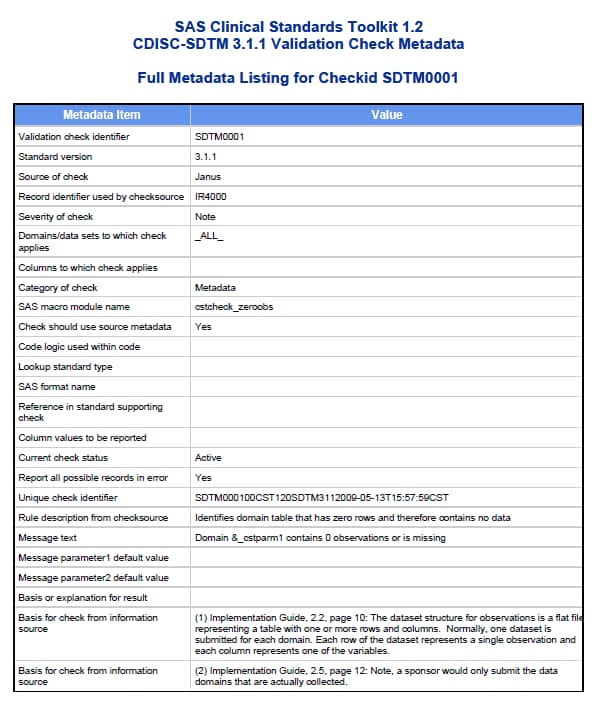Validation Check Metadata Reporting
Report
3 offers the complete set of metadata about each validation check
that is available in the SAS Clinical Standards Toolkit. The report
can be printed in a multi-panel or one-page-per-check presentation
format.
A sample
driver program is provided to define the SAS Clinical Standards Toolkit
environment and to call the primary task framework macro (%cstutil_createmetadatareport).
The following excerpt from the driver program header provides a brief
overview:
cst_metadatareport.sas
Sample driver program to perform the reporting of validation check metadata.
This code performs any needed setup and data management tasks, followed by
one or more calls to the %cstutil_createmetadatareport() macro to generate
report output.
Two options for invoking this routine are addressed in these scenarios:
(1) This code is run as a natural continuation of a CST process, in
the same SAS session, with all required files available. The working
assumption is that the SASReferences data set (referenced by the
_cstSASRefs macro) exists and
contains information on all input files required for reporting.
(2) This code is run in another SAS session with no CST setup
established. In this case, the user assumes responsibility for
defining all librefs and macro variables needed to run the reports,
although defaults are set.
Assumptions:
(1) SASReferences is not required for this task. If it is found, it will be used.
If it is not found, default libraries and macro variables are set and may be
overridden by the user.
(2) The user of this code may override any cstutil_createmetadatareport
parameter values.
(3) Only the cstutil_createmetadatareport &_cstRptControl and &_cstMessages
parameters are required.
(4) If the _cststdrefds parameter is not set, the associated panel cannot be
generated.
(5) By default, a PDF report format is assumed. This may be overridden.
(6) Report output is written to cstcheckmetadatareport.pdf in the SAS
Work library unless another location is specified in SASReferences or
in the setup code below.
(7) The report macro cstutil_createmetadatareport only produces panel 1
(Check Overview) unless any of the last 3 parameters are set to Y.
Report
setup is similar to reporting on process results. The only key difference
is that the call to the %cstutil_reportsetup macro passes a different
parameter value to request check metadata reporting:
%cstutil_reportsetup(_cstRptType=Metadata);To generate the metadata report, the reporting driver program makes one or more calls to the utility reporting macro. At a minimum (using default parameter values), a simple macro call to create report 3 might include the following:
%cstutil_CreateMetadataReport(
_cstValidationDS=&_cstRptControl
,_cstMessagesDS=&_cstMessages
,_cstReportOutput=%bquote(&_cstRptOutput)
);
The following
table describes all supported parameters in the sample %cstutil_createmetadatareport
macro:
A more
complete example of the %cstutil_createmetadatareport reporting macro
includes the following macro call:
%cstutil_createmetadatareport( _cststandardtitle=%str(CDISC-SDTM 3.1.1 Validation Check Metadata), _cstvalidationds=refcntl.validation_master, _cstvalidationdswhclause=, _cstmessagesds=&_cstMessages, _cststdrefds=refcntl.validation_stdref, _cstreportoutput=%nrbquote(&studyOutputPath/results/cstcheckmetadatareport.pdf), _cstcheckmdreport=Y, _cstmessagereport=Y, _cststdrefreport=Y, _cstrecordview=N);
